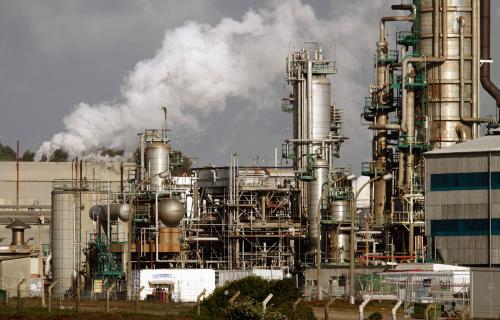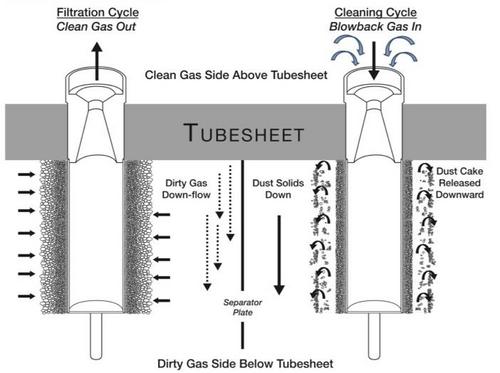Enhancing FCCU Efficiency with Advanced Flue Gas Filter in 4th Stage Separators

In follow up to my previous blog that focused on best practices in Catalyst Hopper Vent Gas Filtration, we now turn our attention to the Fluid Catalytic Cracking Unit’s (FCCU) Fourth Stage Separator (FSS) filtration or the so-called underflow filter.
The FSS has two critical functions: to recover and transfer catalyst fines to a storage hopper and to ensure particulate emissions are minimized to not only protect downstream equipment but also limit the amount of emissions released into the environment.
Boosting Catalyst Recovery in FCCU: The Edge of Sintered Metal Filters
A Fourth Stage Separator (FSS) is commonly installed to remove solids from the underflow gas stream from the Third Stage Separator (TSS). Today, many refineries still rely on FSSs that employ cyclone technology; however, field tests have shown that the use of advanced filters, such as those designed using sintered metal media, are significantly more effective at catalyst recovery than cyclone technology. In fact, when compared with cyclones, a sintered metal filter so substantially reduces the loss of expensive catalyst that it often provides a payback period of less than one year.
Safeguarding Downstream Equipment in FCCU with Superior Filtration
When particulates are allowed to remain in the gas stream, they can cause fouling, plugging, and erosion of downstream equipment, including the turboexpander, waste heat boiler, and their components, requiring that this equipment be taken offline for service. This can result in costly process disruptions.
Look for filters that employ a segmented downflow design. The downflow filter configuration increases the effectiveness of the cleaning cycle by allowing the process flow and gravity to work together to clear the dust from the filter elements and settle it to the vessel cone bottom. The segments ensure the released dust cake does not deposit on the other filter elements. These design features increase filtration cycle times and reduce utility consumption.

Achieving Stricter Emissions Standards in FCCUs with Efficient Flue Gas Filters
Flue gas stream contains carbon monoxide (CO), nitrogen oxides (NOx) and sulfur oxides (SOx). These gases have been proven to adversely affect the ozone layer and contribute to the greenhouse effect and global warming.
These days, refiners are required to implement extremely efficient filtration technology to comply with guidelines that govern particulates emitted from FCCUs. Government regulations in most countries limit maximum particulate emission levels to 50 mg/Nm3, but some countries have taken steps to reduce limits even further – to 40 mg/Nm3.
While the amount of flue gas flow from the FSS is usually only about 3 percent of the total flue gas flow, because it is laden with all of the particulate from the TSS, refiners must pay special attention to filtering this stream.
This is where the design of the FSS becomes critical, especially when filtering high dust loads. If the inlet dust loading to the TSS is low, say less than 200 mg/Nm3, it may be possible to achieve particulate emission levels of less than 50 mg/Nm3 with a 4th stage single cyclone filter. However, if the dust load is high, the only reliable way to achieve the desired emission level is through the use of a porous metal hot gas filter on the FSS. A cyclone filter simply cannot get the job done.
Discussing Your FCCU Filtration Needs: Solutions for the Future
Mott sintered metal Mott HyPulse® GSV filters are proven to far exceed the 50 mg/Nm3 particulates emissions regulation, successfully filtering particulate down to less than 10 mg/Nm3. In fact, over the past 30 years, Mott has been leading the industry in FCCU filtration technology. We have become a trusted supplier to some of the world’s most productive and efficient refineries and are approved on nearly 50 process licenses from the most prominent process developers and licensors.
We offer the widest selection of filter media, more than 20 options in all, ranging from standard 316L stainless steel to corrosive-resistant nickel and Hastelloy®. Sintered metal filters are proven to be strong and fracture resistant, perform well under high pressure and extreme temperatures, have high thermal shock resistance, are resistant to corrosion, and are cleaned in place without disruption to the process. For details on the automatic back-pulsing technology used to clean Mott filter elements during operation, refer to my previous blog.
To learn more about enhancing FCCU efficiency with Advanced Flue Gas Filter in 4th Stage Separators, be sure to contact us and get the conversation started today.